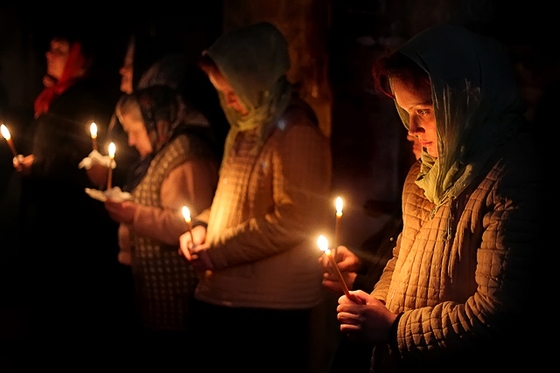I had to apologize to someone Sunday night. In fact, I had to apologize to about a hundred people–one at a time, face to face.
It was great.
For Orthodox Christians, Lent begins differently than it does for Protestants and Catholics. The observance of Ash Wednesday is dramatic and beautiful but is not in the Eastern tradition. For us, Lent comes in gradually over a period of weeks, like a cello line subtly weaving itself into our lives.
Ten Sundays before Easter (or, as we call it, Pascha), we heard the Gospel lesson of the Publican and the Pharisee; before we begin the season of self-denial, we recall that it is futile to boast of self-denial. The Publican’s model of repentance is our aim.
To reinforce that lesson, during the following week there is no fasting. The Orthodox pattern is to abstain from meat, fish, and dairy products on Wednesdays and Fridays year round, but this is one of the few weeks that is suspended and feasting is the rule.
The next Sunday we heard the story of the Prodigal Son, perhaps the most beloved parable. The icon of this scene shows the son in worn clothing, with his feet in rags; he cradles his sorry head in one hand, while stretching the other tentatively toward Jesus. There is nothing tentative about Jesus’ response–he is running toward the son, his arms open to embrace, and a scroll tumbles from his hand: “For this my son was dead and is alive again; he was lost and is found.”

Orthodox confess their sins in the presence of a priest year round, but everyone must make a confession in Lent before receiving the Eucharist on Pascha. The awkward pain and embarrassment of admitting our wrongs is the necessary condition for release and joy. Being thoroughly known, yet loved anyway, is life’s greatest joy. But you must allow yourself to be thoroughly known.
By the third Sunday, we have reached a watershed. The Gospel readings concern the Last Judgment, and pull no punches. Here is the choice: humility, or the cataclysmic rewards of stubborn pride. This Sunday is also called “Meatfare Sunday”–you eat meat this day, because you won’t be eating any for a long time.
During all of Lent, Orthodox strive to abstain from eating certain foods. Our refraining from these foods does not somehow benefit God or make him like us more. Fasting is a form of self-discipline, like lifting weights or jogging. It builds the muscle of self-control. If we can master the temptation to reach for a cheeseburger, we can resist other daily temptations as they come along.
Some people find this fast so taxing it would sour them spiritually, and they must do less. Others find it not stringent enough. No one is to judge anyone else’s fast, or even notice it. But it helps that we all look to a common standard. Since we all fast from the same things at the same time, we can trade recipes and commiserate.
With the following Sunday, seven weeks before Pascha, Lent begins in earnest. This is called “Cheesefare Sunday,” and from now until Pascha we will abstain from meat, fish, dairy products, wine and olive oil. At the evening Vespers service we trade the bright chant melodies for more sober ones, and say the prayer of Ephrem the Syrian, a fourth century hermit: “O Lord and Master of my life, take from me the spirit of sloth, faint-heartedness, lust of power, and idle talk.”
If you were in our church on this Sunday evening you would see us fall to our knees and then place the palms of our hands on the floor, and touch our foreheads down between them. This is called “making a prostration.” You may have seen Muslims praying this way toward Mecca. This traditional Middle Eastern worship expression was used by Christians for centuries before the founding of Islam.
At last we reach the Rite of Forgiveness. As vespers come to a close, parishioners form a large circle. Nearest the altar the two ends overlap, as a deacon turns to face the priest. The priest bows to the ground, then stands to say, “Forgive me, my brother, for any way I have offended you.” After the deacon says “I forgive you,” he bows to the ground, and asks for and receives the same forgiveness. Then the two embrace. Each of them moves to the next person in line.
Over the course of an hour or so, every single person will stand face-to-face with every other person. Each will bow to the ground and ask for forgiveness; each will bestow forgiveness on the other.
As my husband says, “When we do this, we do something the devil hates.” Teenage brothers and sisters forgive each other. Small children solemnly tell their mothers, “I forgive you.” Folks who have been arguing about the church budget for months embrace with tears.
In fact, tears are the common coin of the evening. Some weep hard as they look in each face and think how they have slighted, ignored, or resented this person during the year–a person now revealed as bearing the face of Christ. Some weep as they are forgiven, over and over, in an overwhelming rush of love and acceptance. Some weep and hug so much they hold up the line. A toddler ignores the line and goes from person to person, tugging on a skirt hem or trouser leg and looking up to ask, “Forgive?”
This is how Lent begins for us. It’s an exhilarating kick-start for a time that will get much harder. The number of required services during Lent increase dramatically–during Holy Week there are 11–and they get longer as well. Food simultaneously gets shorter. Old knees don’t like prostrations.
In all this, though, we rejoice; in the company of our friends we can run this race. It is good that it begins with forgiveness.
Source: Beliefnet



















